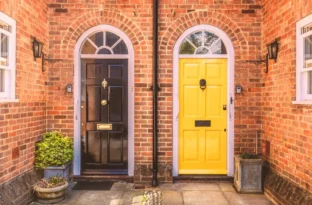Questions to Ask Your Conveyancer
29 February 2024 • 5 min read

See what our customers have to say about us
Before choosing the right conveyancer for you, it is important that you ask the all-important questions so that you have the best understanding of who you are trusting to help your moving process go as smoothly as possible.
Whether you are buying or selling, conveyancing solicitors are a vital part of the process, so it’s key that you have a good understanding of who you are instructing. So, we’ve compiled a list of questions best asked early on in the conveyancing process.
1 – How much will you charge, and what’s included?
It might seem obvious, but many people forget to ask. It’s wise to shop around and get quotes from different conveyancing solicitors to ensure you’re getting a good deal.
Most quotes include third-party costs or disbursements such as conveyancing searches and Stamp Duty; however, some don’t. It’s a good idea to ask for a breakdown of what is included in the costs.
2 – Who will handle my case?
Often, an experienced conveyancer will provide a quote, and then a junior conveyancer handles the case. This isn’t a problem as junior conveyancers still have the education and experience to handle the conveyancing process, but it’s good to know who your point of contact is so you can build a rapport with them.
3 – Have you dealt with a case like mine before?
While most home sales are pretty straightforward, there are factors that can make some things more complicated. For example, if you’re buying a new build home or a leasehold, it’s better to pay for a solicitor with experience dealing with similar properties.
4 – How often will I hear from you?
You may find yourself waiting long periods to hear back from your conveyancer, wondering whether everything is as it should be. However, you also don’t want to bug them if they are trying to move your transaction forward.
With the MuveFast upgrade, you’re guaranteed to exchange for a freehold property within 5 weeks and for a leasehold within 8 weeks, or you get your upgrade fee back for each week over the timeline.
This is why it’s advised to have a conversation right at the start to let your conveyancer know whether frequent updates matter to you, whether you’d only like to know when something changes or if you need to do something. Muve have dedicated account managers who give regular updates and glowing reviews to support this.
5 – What costs will I have to pay if the sale falls through?
Not all offers result in a sale. For example, conveyancing searches may flag up a few issues that cause the sale to fall through, or your conveyancer may spot a few legal problems which make you decide to pass on the property.
Therefore, by asking your conveyancer what happens if the sale doesn’t go through, you can be prepared and plan accordingly. Muve have a “no move, no fee” policy, so if the sale doesn’t go through, you don’t have to pay anything; however, not all firms are the same, and some may not include third-party costs. Some conveyancers will be happy to move the payment to a new property, while others will still charge the total amount or a percentage of the fee.
6 – What’s your procedure for disputes?
It is unlikely that anything will go wrong, but it’s best to be prepared for the worst-case scenario. Asking how the conveyancing firm handles it will give you a good sense of their customer service and the knowledge needed if you need to raise a concern.
7 – When do I need to pay conveyancing fees?
Different firms may expect you to pay either when you exchange or complete. Some firms may ask you to pay a deposit before the process, whereas others may require disbursements to be paid for as the conveyancer deals with them. Find out before you instruct a conveyancer so you know when you’ll have to pay fees.
8 – What can I do to keep things running smoothly?
While your conveyancer handles most of the process, some tasks will require your input, such as signing contracts.
Your conveyancer can advise you on what you can do and ways to speed up the process, such as having certain documents ready to hand.
9 – What cybersecurity measures have you put in place?
With scams and diverted payments on the rise, ensuring that the conveyancing firm you choose has a high level of security is important.
Always check the account details with your solicitor when transferring money, and never trust an email that tells you to transfer funds to a different account. When transferring money, you can always send a small amount as a check to confirm it has been received.
10 – Do you have any holidays booked?
Asking your conveyancer whether they have planned holidays might seem an odd question, but it’s worth checking if you’re moving over the festive period or during the summer holidays. Conveyancers are more likely to take holidays during these periods, so you may want to ask who will cover their workload while they are away and what their contact details are.
For some firms, the process can only progress if the designated conveyancer is available to make decisions.
Getting the answers to these kinds of questions can be very helpful in your task of appointing the right conveyancer for you. If you have any further questions or need help from a conveyancer, don’t hesitate to get in touch or get a free quote.
You might also like
Conveyancing covers the legal and administrative processes by which the ownership of a home ...
Muve’s No Move, No Legal Fee guarantee is an assurance that if a property ...

